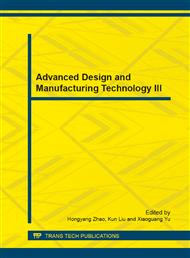[1]
Ma Weiming: Integrated power systems-trend of ship power development, Journal of Naval University of Engineering, 2002, 14 (6), pp.05-08. (in Chinese).
Google Scholar
[2]
Yang xiuxia, Zhang Xiaofeng, Zhang Yi: Development Tendency of Ship Power System, China Ship repair, 2004, 17(3), pp.12-14.(in Chinese).
Google Scholar
[3]
Ma Weiming. Advanced Power System Automation and Protection (APAP), 2011 International Conference, pp.1293-1302. (in Chinese).
Google Scholar
[4]
Sun Chunshun, Wang Yaonan, Li Xinran. Synthesized power and frequency control of wind power generation system assisted through flywheels.Proceedings of the CSEE,2008,28(29):111-116. (in Chinese).
Google Scholar
[5]
WANG Chengshan, WANG Shouxiang. Study on some key problems related to distributed generation systems. Automation of Electric Power Systems, 2008, 32(20): 1 -4. (in Chinese).
Google Scholar
[6]
CUI Jinlan, LIU Tianqi. Distributed generation and its grid interconnection issue. Modern Electric Power, 2007, 24 (3): 53-57. (in Chinese).
Google Scholar
[7]
Ouddalov A, Chartouni D, Ohler C. Optimizing a battery energy storage system for primary frequency control[J].IEEE Transactions on Power Systems,2007,22(3):1259-1266.
DOI: 10.1109/tpwrs.2007.901459
Google Scholar
[8]
LU Zongxiang, WANG Caixia, MIN Yong, et al. Overview on micro grid research. Automation of Electric Power Systems, 2007, 31(19): 100 -107. (in Chinese).
Google Scholar
[9]
Ji Feng. Study on control strategy of flywheel energy storage system compensating IPS voltage. Naval University of Engineering, 2012: 14-15. (in Chinese).
Google Scholar
[10]
Ding Ming, Xu Ningzhou, Bi Rui.Modeling of BESS for smoothing renewable energy output fluctuation.Automation of Electric Power Systems, 2011, 35(2): 66-72. (in Chinese).
Google Scholar
[11]
Ding Min, Zhang Yingyuan, Mao Meiqin, et al. Economic operation optimization for microgrids including Na/S battery storage. Proceedings of the CSEE, 2011, 31(4): 7-14. (in Chinese).
Google Scholar
[12]
Kazempour S J, Moghaddam M P, Haghifam M R, et al. Electric energy systems in a market-based economy: comparison of emerging and traditional technologies, Renewable energy, 2009, 34(12): 2630-2639.
DOI: 10.1016/j.renene.2009.04.027
Google Scholar
[13]
DING Ming, LIN Gende, CHEN Zinian, et al. A control strategy for hybrid energy storage systems. Proceedings of the CSEE, 2012, 32(7): 1-6. (in Chinese).
Google Scholar
[14]
WAN G Hongfu , CAO Jun, QIU Jiaju , et al. An active power compensation model for grid-connected distributed generation system. Automation of Electric Power Systems, 2009, 33(8): 94-98. (in Chinese).
Google Scholar


